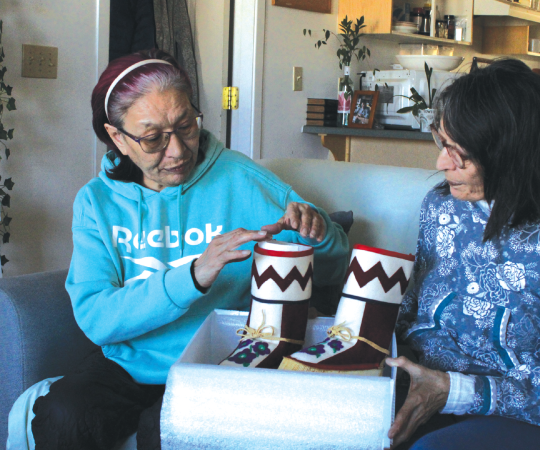The Iqaluit Qajuqturvik Community Food Centre doesn’t look like itself. The local soup kitchen—the name means “place to eat” in Inuktitut—is usually busy providing 300 to 500 caribou stews, chicken soups or Arctic char steaks to more than 100 Iqalummiut a day. But on this Saturday night in late March, drapes cover the windows and dark cloth hides the grey plastic tables. Under a dim light of artificial candles and with 1980s music playing, about 50 people eat caramelized onion bisque with rosemary garlic focaccia, whipped potato, demi-glace, Earl Grey cake with maple syrup whipped cream and braised short rib that’s been slow cooking since Wednesday. For one night, the food centre is a fine dining spot with a chef, sous chefs and servers.
Walking among the tables, Joseph Murdoch-Flowers, one of the sous chefs and co-executive director of the food centre, which is hosting this fundraiser, says, “Nice beef, right?” Everyone within earshot laughs. He really loves the word “beef.” It’s his thing. A long-running joke between him and all of Iqaluit.
One of the North’s fiercest advocates for reconciliation, human rights and food security, Murdoch-Flowers is also a lover of karaoke, baking, colourful T-shirts and adventurous facial hair ranging from sideburns to full beard to horseshoe moustache. Over the last dozen years, the 46-year-old with a long and eclectic resumé has taken on the grimmest elements of Nunavut life. But he’s also brought his community joy and cherished moments of relief. Uncommon and quirky. If only they could last.
WHEN MURDOCH-FLOWERS, who grew up in Labrador and Nunavik, first stepped off the plane at Iqaluit Airport, in 2013, one of the people who greeted him was Jonathan Ellsworth. The chief operating officer at Nunavut Legal Aid had heard about Nunavik’s first Inuk law school graduate who’d spent a year working as a law clerk for a federal judge. Ellsworth wanted to hire him. After taking the job, Murdoch-Flowers quickly learned that the system he was working in was never built for remote Inuit communities. “The justice system is complicated. It’s intimidating, it’s foreign, especially to Inuit,” he says. “If I was able to take someone who came to me really nervous, afraid, confused and to have them leave the meeting feeling like they understand a little bit more, I felt like I did a good job.”
In 2015, he represented Eetooloo Ejetsiak in a prominent case of alleged police brutality that forced a review of the Nunavut RCMP by the Ottawa Police Service. Later, when Murdoch-Flowers became a local justice of the peace, he challenged the legal system and the RCMP to be more sensitive to domestic violence.
In 2017, Murdoch-Flowers was one of the lawyers preparing family members to testify at the National Inquiry into Missing and Murdered Indigenous Women and Girls. “I worked with people who had very difficult and sensitive stories to tell under the spotlight of this event,” he says. These stories were familiar to him as an Inuk man growing up in the North.
But just over a year ago, Murdoch-Flowers stopped practicing law to become the co-executive director of Qajuqturvik Community Food Centre. That meant doing everything from chopping vegetables to hosting fundraising dinners and gatherings of national food-security leaders. The job combines two of his passions: working with people and food. For six years, until 2006, Murdoch-Flowers worked as a chef in various Montreal restaurants.
He soon added another role: Nunavut’s ethics officer. Public servants can come to him to disclose wrongdoing within the Nunavut government. And then, in March of this year, he became one of the nine directors of the inaugural board of the National Council for Reconciliation, which will promote the goals of reconciliation and monitor the efforts in achieving them across the country. The position is for 18 months and then the council will elect a new board of directors for a four-year term. Human rights lawyer Tanya De Mello, a former law school classmate of Murdoch-Flowers’s, says he’ll make a difference. “He’s not out to shame. He’s not out to accuse,” she says. “He’s out to hold us accountable so that we can do right by the people that are the founders of this land. He will bring a lot of dignity because it’s so personal to him.”
Shortly after the Truth and Reconciliation Commission’s final report came out, in 2015, Murdoch-Flowers started a YouTube project called #ReadTheTRCReport with Erica Violet Lee, a Nēhiyaw woman in Saskatoon, and Zoe Todd, a Métis writer in Edmonton. After Murdoch-Flowers and Todd read the executive summary and posted the videos, 132 Indigenous and non-Indigenous people from across Canada read parts of the 388-page report.
While Murdoch-Flowers says he’s not political—“I’m just a guy trying to figure out life,” he says—he’s an experienced activist. In 2012, La Presse published a series of articles about Nunavik called “La Tragédie Inuite” (The Inuit Tragedy). The article focused on the region’s problems, including school dropout rates, recent murders and alcoholism. Murdoch-Flowers started a letter-writing campaign arguing that the North deserves better than the sensationalizing of its traumas. Inuit leaders, including future Governor General, Mary Simon, then president of the Inuit Tapiriit Kanatami, joined the campaign. “It was an irresponsible and harmful depiction of the community that I came from,” Murdoch-Flowers says of the article. “It didn’t pay enough attention to the richness of the culture, the people, their resilience, the beauty of the language and the land.”
Over the years, people have encouraged him to run for political office at the local, territorial and federal levels. “I think he’d make a great politician,” Bill Flowers says, acknowledging that as a dad he might be a bit biased. But that’s a regular argument between father and son. Although Murdoch-Flowers often works with politicians, he’s not interested in a political career. “I have given permission to a friend of mine to pull me aside and slap me in the face if I ever consider running for office,” he says. “I don’t want to put my family through that.”
SEVEN IQALUIT SOURDOUGH enthusiasts gather at the Qajuqturvik Community Food Centre in February for the first official meeting of the Iqaluit Sourdough Club. They “bread taste” each other’s loaves and share their sourdough starters—Murdoch-Flowers has named his Preserved Oranges—as Bread’s “Make It with You” plays in the background. “Joey really believes that we are here to enjoy this life,” De Mello says, and he has always been good at finding that joy even when it seems almost impossible. “I think people think we do this work because we want to slap somebody on the wrist when they do something wrong,” she says, adding that finding joy is an important part of any advocate’s work. Especially in the North.
Every second person in the territories has been physically or sexually assaulted since the age of 15, according to a 2020 Statistics Canada study. As of 2021, 76 per cent of Inuit in Nunavut over the age of 15 live in food-insecure households, roughly six times higher than the national average, according to the Inuit Tapiriit Kanatami. Suicide rates, substance abuse, crime severity index—all of them are notoriously high in the territory. And in 2025, Nunavut Tunngavik Inc., the lands claim organization, said that by “all social indicators,” life is getting worse for Inuit.
But locals find joy in many ways. They come together for hunting, fishing, hockey, speedskating and birdwatching. Every month, Iqaluit dancing aficionados gather at the local Roman Catholic Church to learn tango or rumba. And, of course, they sing karaoke. At the Chartroom Lounge, Royal Canadian Legion, Storehouse or Nunavut Brewing Company. “Sociable!” someone inevitably shouts in between verses, a sign for everyone to raise their beer glasses and drink. Murdoch-Flowers is a karaoke regular at the brewery, often singing faves by Nick Cave or Weird Al Yankovic or, as he admits, “something that would make people uncomfortable.” That’s part of his goofy sense of humour.
A university-educated linguist, Murdoch-Flowers also has a love for words and their phonetics. His favourite is riboflavin, a chemical name for vitamin B2. “I think it’s the funniest word in the English language,” he says. “It feels like your mouth is doing gymnastics.”
Another of his favourites: beef. As in cow meat. “It’s a funny-sounding word,” he says. “Beef.” His Facebook page has been dedicated almost exclusively to beefs. Friends send “beef submissions” ranging from beef-shaped graffiti to “beefday” wishes on his birthday and, of course, photos of beef itself—fried, roasted or in shawarma. But in mid-March, after receiving 80 of them in 2025 alone, he announced: “I will no longer accept beef submissions. It’s gotten out of control, and it no longer feels fun.”
The end of the beef era for his Facebook was a sign of something else. Murdoch-Flowers and his family are moving to Ottawa. “It feels weird,” he says. Then, holding up a yellow mug with a drawing of an ulu, a traditional Inuit knife, he adds, “I’m thinking maybe I should pack this mug tomorrow.” In the corner of his living room, there are more than a dozen stacked-up boxes containing the life of his family for the past 12 years. “I’m not really thinking too much about how I feel right now.”
He and his wife, Jayne, have a 10-year-old son and a six-year-old daughter who will attend a private school in Ottawa in the new school year. “I wasn’t expecting to be going,” Jayne Murdoch-Flowers tells about a hundred people—including former and current justices of the Nunavut court, lawyers, journalists and karaoke and trivia hosts—during a farewell brunch at the food centre. “But it’s the right thing for us to be doing as a family.”
Later, Murdoch-Flowers holds a smaller goodbye meetup at his house for his fellow karaoke enthusiasts. A dozen of them gather in the living room, which is already almost empty. One of the couches has been sold so some guests sit on the floor. They take turns singing the appropriate tributes—from beef classics like “Shake Hands With Beef” by Primus to newish tunes like “I Am Cow” by The Arrogant Worms.
Murdoch-Flowers has made some of his signature bread for the occasion; he has been baking it every day to use up the leftover flour. “I don’t know Iqaluit where there is not Joey,” one of the guests quietly says amid all the songs and cheers. “It will be a different place.”
But he might not be gone forever. “Who knows?” he says. And he is certainly not gone completely. He’s staying on as co-executive director of the food centre and will be flying back and forth between Ottawa and Iqaluit. “I feel like I am a part of this community,” he says, “and this community is a part of me.” After all, this is Iqaluit, where almost everybody knows his name.









